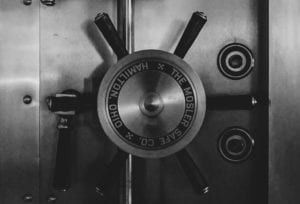As a financial planner, I get the question “Should I pay off my debt or invest?” all the time. Keeping the money in the bank, paying off debt, or investing may be the best choice depending on your situation. In this article, we’ll examine when each one of these options may make sense depending on your situation.
1. Keep Money in Bank

With interest rates low, this often gets overlooked but can still make sense in a couple of scenarios.
First, make sure you have enough cash in your emergency fund (typically 3-6 months of expenses).
Second, think about upcoming financial goals you have. If you are planning a large trip, car purchase, or some other expense soon, the best thing to do may be to keep that money safe in the bank.
The reason to keep these buckets of money safe is if you invest it, you could be forced to sell at a loss when you need to withdraw the funds. You also want to avoid using the money to pay off a loan if you might just need to take out a new loan to pay for an upcoming expense, potentially with a higher interest rate.
Two of the more competitive banks for savings accounts recently have been Ally and Marcus. As of August 2021 these banks are offering savings accounts at 0.5% interest, which beats the .01% being offered most places. If you are keeping a larger sum in the bank, it may be worth your time to increase the interest you are earning on your deposits.
When keeping cash in the bank makes sense:
- The money is a part of your emergency fund (3-6 months of expenses).
- The money will be used within the next few years for financial goals (buying a car, vacation, etc).
- Your debt isn’t from credit cards or other high interest loans.
2. Pay Off Debt

The biggest factor in deciding if you should use your cash to pay off your loan is the interest rate you are paying. The second factor is your comfort level with risk.
To test if you should pay off your loan, ask yourself the question: “If I could invest and earn a guaranteed X% return, would I take it?” X% is the current interest rate of the loan you are considering paying off. If the answer is “Yes”, it may be a good idea to pay off the debt.
A penny saved is a penny earned, so avoiding paying interest should be viewed similarly to earning a return from an investment. The difference is that by paying off debt you are guaranteeing saving on interest. Whereas with investing, there is risk involved and your return could be less than you thought or even negative. It’s best to take a sure thing (avoiding interest) rather than a risk (investing) if the returns will be the same. (For purposes of this article we are ignoring tax implications which can vary greatly depending on the type of loan and investment).
For most people I talk to, the real gray area is around a loan with a 4-6% interest rate. For loans below a 4% interest, most people tend to be willing to invest whereas debt above 6% most will pay off the loan. This is not the case for everyone and it depends on your risk tolerance and relationship with debt.
If you are risk averse, the peace of mind that comes with being debt free may make this a more appealing option even at relatively low interest rates. Regardless of if that tends to be the most efficient strategy of not, I have seen an aversion to debt be a positive indicator of overall long term financial success.
If you have multiple loans, I recommend using a “debt avalanche” strategy. This involves prioritizing paying off your highest interest rate loans first. Once paid off, begin chipping away at the next highest interest rate loan. This strategy minimizes the amount that you will end up paying in total interest over the life of your loans.
When paying off debt makes sense:
- You have high interest debt.
- You have extra cash in the bank after accounting for your emergency fund and short term goals.
- You are risk averse.
- You like the idea of being debt free.
Note: Student loans need to be handled separately from other debt due their complexity. Research or consult with a Certified Student Loan Professional (CSLP) if you have a complex situation before making a decision to pay off your student loans.
3. Invest

If you have enough cash in the bank and your debt is a relatively low interest rate, investing can be your best option in some cases.
Before investing, make sure you have a relatively long time horizon (5+ years) and are comfortable with investing risks so that you can weather any short term stock market volatility. If your annual investment return exceeds what the interest rate on your debt is, this strategy can end up yielding the best long-term results.
This is a more aggressive strategy than paying off debt, so make sure you’re comfortable with the risks of your investment portfolio. Any time you are making an investment, we recommend you have a financial plan that includes diversified investments. By having an investment plan, you can avoid making poor investment choices especially during times of market volatility.
When investing makes sense:
- You have low interest debt.
- You have extra cash in the bank after accounting for your emergency fund and short-term goals.
- You tend to be a bit more aggressive and are comfortable with investment risks.
- You can keep the money invested for at least 5 years.
- You have a financial plan that includes a diversified portfolio.
A special warning about margin
Investing while you have some debt can be an aggressive strategy. Depending on the interest rate, type of debt, time horizon, risk tolerance, it can be a calculated risk that may pay off. However, one type of loan I would always avoid is a “margin loan”.
A margin loan occurs when a brokerage firm allows you to borrow some of the purchase price of a stock. The idea is that if you buy stock on margin and it goes up, your gains will be amplified. However, losses are also amplified and can be devastating.
Not only will you be paying interest on the amount you borrow, if the stock goes down, you stand to lose much more money as well. In some cases, you can lose more money than the amount you deposited. You can also be forced to sell your investments when they have gone down, locking in losses.
A margin example:
You deposit $50,000 in a margin account. You see your broker allows you to buy $100,000 of stock and buy 1000 shares of XYZ at $100/share. XYZ has a bad earnings report and goes down to $30/share. Your broker sells all 1000 shares of XYZ to cover your margin call. Not only did you lose your initial $50,000, you would owe an additional $20,000 to cover the losses in the shares you borrowed. Plus, you would owe interest on the amount you borrowed.
Brokerage firms have been more eager to lend money on margin in recent years. Sometimes investors borrow on margin without even realizing it (margin loans are a big source of revenue for brokerage firms, especially as other fees have continued to compress).
I bring this up because of the recent increase in margin accounts, market volatility, and meme stocks. I recommend people invest in a diversified portfolio, and never on margin. If you have a margin account, consider switching to a “cash” account instead.




